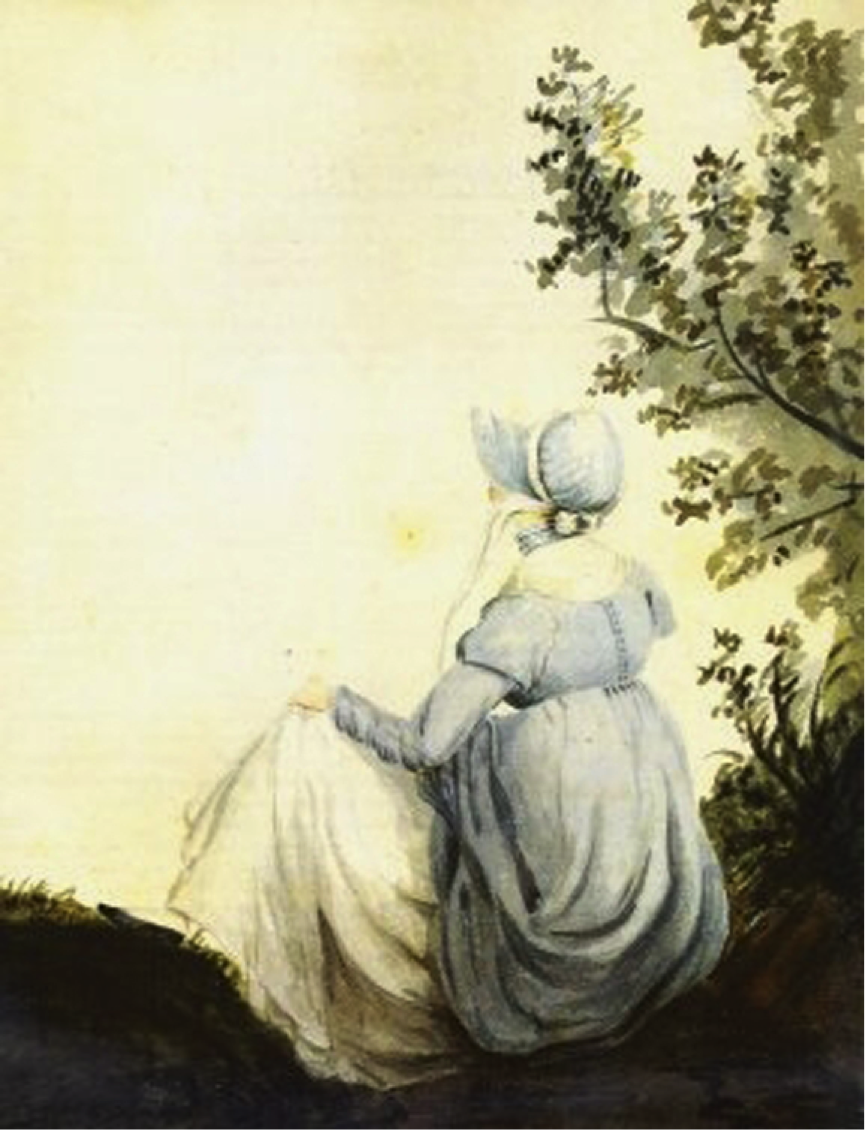“And, pray, who is Charles Hayter? Nothing but a country curate. A most improper match for Miss Musgrove of Uppercross.”—Mary Musgrove, Persuasion

Mary Musgrove did not consider a “country curate” good enough for her sister-in-law to marry. Mary’s father, Sir Walter Elliot, also looked down on curates. He considered the former curate of Monksford (Captain Wentworth’s brother), to be “nobody,” “quite unconnected,” and certainly not a gentleman or a man of property. Sir Walter also despises a naval officer whose father was “a country curate, without bread to eat.”
Rector, Vicar, or Curate?
Curate comes from the Latin word “cure,” meaning “care”—a curate is someone who cares for souls. So technically any clergyman (minister, pastor) is a curate. But in the national church of Jane Austen’s England, clergy were ranked according to their income. Rectors received the most, then vicars, then curates. All did the same work: reading prayers (leading church services), preaching, performing services such as weddings and baptisms, and community services such as providing relief for the poor.
Most of a clergyman’s income came from tithes of the parish he was responsible for. Farmers were required to pay one-tenth of their yearly produce to the clergyman (even if the farmers were not Anglican!).
A rector, like Mr. Collins in Pride and Prejudice, received all the tithes. This included the “great tithes,” about three-fourths of the total: usually the tithes of grain, hay, etc. The rector also got the “small tithes”: tithes of animals, eggs, poultry, etc. Austen’s rector characters received between 200 and 1000 pounds from their parishes (200 for Edward Ferrars in Sense and Sensibility, close to 1000 for the Grants in Mansfield Park).
A vicar only got the “small tithes.” In a parish with a vicar rather than a rector, the local squire or someone else got the great tithes. Mr. Elton of Emma was a vicar, so he needed a wealthy wife. We know his living was not a large one, since Mrs. Bates, the widow of the former vicar, lived in poverty. (Emma, of course, was clueless about Mr. Elton’s financial needs.) Mr. Elton’s income was probably about a quarter of what a rector’s income would have been for the parish.
The curate was far down the financial and social scale from both the rector and the vicar. He got a salary, which was generally half (or less) of what a vicar might receive. In 1813, the median income of a curate was only £55 per year. Some received as little as £4 a year! A few received over £200, though. £55 was Henry Austen’s income (Jane Austen’s brother) when he took his first curacy, at Chawton, in 1816.

The Curate’s Poverty
What did that £55 mean? Those with almost twice as much, £100 a year, could barely afford one servant, a “maid of all work.” Having servants in Austen’s day might be equivalent to having modern conveniences nowadays—having one servant would be similar, for us, to having running water, but no electricity or appliances. £55 would not even afford one servant. It was said that many curates would have been better off working as servants in wealthy households.
How did poor curates survive?
- Many (not all) lived in poverty and often in debt.
- Some were allowed to live in the parish parsonage. Often, though, there was no parsonage, it was not livable, or it was rented to others, and the curate had to pay for his own lodgings.
- A rich patron might supplement a curate’s income. Queen Anne’s Bounty was a government program set up to supplement poorer livings.
- Many curates tutored individuals or taught groups of children.
- Many took multiple churches, riding from one to the next all day Sunday, but unable to take care of parish needs during the week.
- Because their jobs were poorly-paid and insecure, curates were often looking for something better rather than focusing on their current parish(es).
- It was difficult to support a family on such a wage, unless the curate married someone with money.
Types of Curates
- Perpetual curates held their posts for life, as rectors and vicars did, but still received low salaries.
- Stipendiary curates were paid a “stipend” for their work. They could be dismissed at any time. Charles Hayter was most likely a stipendiary curate.
In this time, church livings were considered an income source more than a calling or opportunity to serve. Livings were bought and sold and given to relatives and friends. Many clergymen held more than one living, to increase their income. They might live at one of them and minister there, and hire a curate to minister at their other parishes. Charles was most likely a curate for a clergyman who lived elsewhere, doing that man’s work but receiving only a small proportion of the income from it.
- Temporary curates substituted for a clergyman while he was away or ill. In Northanger Abbey, Henry Tilney had a curate who did the work of his parish while Henry was in Bath or at his father’s home.
- Assistant curates helped a resident clergyman. In Mansfield Park, Mary Crawford says that Dr. Grant’s curate “did all the work” (though Fanny says Dr. Grant preached very good sermons twice on Sundays). Ideally, a newly-ordained clergyman served as an assistant curate for a time, to learn from an established clergyman before taking his own parish.
Stuck as a Curate
But, about 20% of ordained clergymen never got their own parish, and stayed curates all their lives. Another 35% had to wait many years to get their own parishes. Why was this so difficult?

- Retirement: In Persuasion, Henrietta hopes that her parish rector, Dr. Shirley, will retire to Lyme for his health, and hire Charles Hayter as his curate, making it the best he can afford. However, there was no retirement program for clergy. Dr. Shirley would need to keep his clerical living or have no income. If he did retire, he would probably only be able to pay a small amount to his curate, as Dr. Shirley would need continued income to pay for his home and expenses in Lyme. Clergymen generally kept their livings until they died, no matter how old or sick they became.
- “Pluralism”: Many clergy held multiple (“plural”) livings. Sometimes this was because individual parishes were too poor to sufficiently support a clergyman, and so clergymen needed incomes from several parishes. Jane’s father, George Austen, held the livings of Steventon and nearby Deane, only a few miles apart. He was able to lead church services at both churches and care for both parishes, though he still needed to take in students to provide for his family. Other clergy took additional parishes to make themselves richer. Those parishes without a resident clergyman (very much to their detriment, as Sir Thomas Bertram laments in Mansfield Park) were covered by a curate.
“Charles has a very fair chance, through the Spicers, of getting something from the Bishop in the course of a year or two.”
- Patronage: Those who remained curates usually did not have good social connections. Advowsons, the legal right to choose the next clergyman for a living, were held by various people and could be inherited or bought and sold. Some were owned by the King, others by the universities, some by the bishops and cathedrals, and about half by individuals like Lady Catherine de Bourgh in Pride and Prejudice. The idea was that the local squire, like Colonel Brandon in Sense and Sensibility, would find a person good for the community and give him the post of rector or vicar for that parish. However, by Austen’s time, many parish rectors and vicars were chosen by someone outside the community.
The Hayters apparently had influential friends named the Spicers, who might eventually convince a bishop to give Charles Hayter one of the livings controlled by the bishop or the cathedral.
A Temporary Living
“Charles Hayter had been applied to by a friend to hold a living for a youth who could not possibly claim it under many years.”
Lucrative livings were often reserved for family members.
In Persuasion, some person holding an advowson has a son or brother or nephew or other connection who is too young to take the living he is destined for; he can’t be ordained until he is 23. The clergyman holding the living has died, and someone else must be appointed within six months (otherwise the bishop will take it over and assign someone). Charles Hayter takes it, agreeing that he will resign when the young man is old enough to take it. He probably signs a resignation bond, saying that he will resign on request, or if not, will pay a penalty of thousands of pounds.
In the end of Persuasion, Charles gets this temporary living, with “almost a certainty of something more permanent long before the term in question.” So he and Henrietta will likely be provided for, living in a church parsonage, and eventually inherit his father’s estate. Many other curates were not so fortunate, and spent their lives as “nothing but a country curate,” poor and socially despised.

Opportunities
However, curates still had many opportunities to serve their communities. The Evangelical John Newton, writer of “Amazing Grace,” served as a poor curate for many years in Olney. His sermons there changed many lives, and his books and hymns impacted even more. A wealthy Evangelical, John Thornton, supplemented Newton’s salary to enable him to offer hospitality and host church meetings in his home. Thornton eventually got Newton a living in London as rector of St. Mary Woolnoth.
There were many good, faithful clergymen in Austen’s England, as well as those who considered the church only as a means of financial security. We don’t have to follow our society’s expectations and norms. How can you use the situation you’re in today, despite its drawbacks and disappointments, to do good and bless those around you?
Sources (partial list)
Jane Austen and the Clergy by Irene Collins
The Church in an Age of Negligence by Peter Virgin
The Curate’s Lot by A. Tindal Hart
“Money” by Edward Copeland, chapter 9 in The Cambridge Companion to Jane Austen



wonderful presentation
LikeLike
Thanks very much, Renata! It was a joy to do, because of such a great audience!
LikeLike
Some fascinating stuff here! I think that Patrick Bronte was a curate in Haworth (though later than Austen) and so was keen to find a second wife with money. The Poldark books (ok, and TV series) refer to the horrible Osbourne Whitworth trying to find more parishes in which to pay the curates very badly and claim all the monies himself. Happily curates today are usually only temporary and paid a reasonable amount by the diocese in which they work, but are not overly rich unless their spouse works full time!
LikeLike
Very interesting. I’ve been looking at various sites about Patrick Bronte (father of wrtiers Emily, Charlotte, and Anne Bronte). It appears he had several posts as assistant curate, during Austen’s lifetime, then was a perpetual curate. Some sites say he was then vicar of Haworth (i.e. go to venn.lib.cam.ac.uk and search for him), others that he was perpetual curate. But yes, it would explain his need for money! The Poldark reference is interesting also.
Perhaps I should have clarified that today’s setup and priorities in the Church of England are very different than they were in Austen’s day! Much, much improved, as I understand it. 🙂
LikeLike
The problem I have with all of this is that Charles Hayter was well born and the heir to his father’s estate And yet, Mary Musgrove could only see his current profession as a curate?
LikeLike
Agreed. I just got done watching Persuasion with Ciarhan Hinds & They discuss Charles Hayter’s character(very small part) but significant to the story to show Mary (Ann’s married sister) didn’t dare go into the “curates” home because of such low connections. I just learned of this fascinating fact of curate during this era. Everything was about birth and connections. But Ann’s character is mo snob to society norms. It is interesting that the Musgrove family were not snobby like Ann Elliots family. I study Jane Austen. I love delving into her world & I hope to visit the places she talks about (Lyme, Bath, London). So thankful for Miss Austen’s talent to write in a man’s world. (Subjugation of women throughout history. I am fascinated by strong women like Elisabeth Bennett of P&P).
LikeLike
Yes, the statement is more about Mary’s snobbery than about Charles’s position. Mary’s husband (also Charles) tries to remind her that Charles Hayter is the heir to an estate (though it was small, I think), but she is determined that he is not good enough for the family, so she puts him down by focusing on him being “nothing but a country curate.”
Patricia, I hope you get the chance to visit those wonderful places! Notice I have a series on travel on this website, talking about places to see related to Austen and her times, so I hope you’ll check that out. See the link to “travel” in the categories at the top of the page.
LikeLike
Charles Hayter was not from a titled family like Mary, who was the daughter of a baronet. So she looked down on him. Hayter was essentially a farmer’s son, with some property but not as much as the Musgroves had, it sounds like. And, he would not have much income until his father died, unless he got a good church living.
LikeLike
I enjoyed this, thanks!
LikeLike
You’re welcome, Sallianne, glad you enjoyed it!
LikeLike
Excellent post and insightful post! Thanks for all the great information. It gives Austen’s novels a little more context and texture.
LikeLike
You’re welcome, Alicia, glad you enjoyed it.
LikeLike
Oh, the poor curate. Your presentation at the AGM in Chicago was so enlightening; and Deb Barnum tells me your talk with her JASNA group was just fabulous. You have such a clear voice and vision when it comes to discussing curates, vicars, and rectors. You’ve helped me sort the clergy in Georgian England!
LikeLike
Thanks so much, Vic! My pleasure.
LikeLike